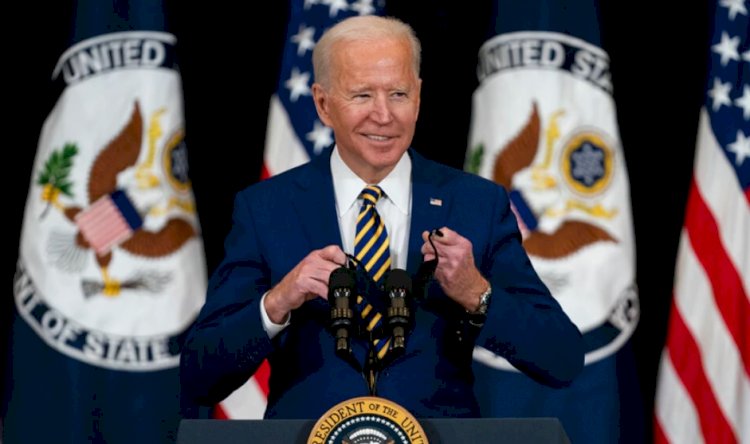Biden Promises Sharply Increased US Engagement Around the World
As for China, Biden said, “We’ll work with Beijing when it’s in our interest to do so.”

Biden Promises Sharply Increased US Engagement Around the World
President Joe Biden promised Thursday that the United States would sharply increase its engagement around the world during his White House tenure, ending what he contended was the “past few years of neglect and abuse” of foreign relations by former President Donald Trump.
“America is back,” Biden declared at the State Department in his first major foreign policy address as president. “America cannot afford to be absent on the world stage. Diplomacy is at the center of our foreign policy.”
He said that “American alliances are our greatest assets,” while warning both Russia and China of American resolve. Trump, employing an “America First” credo, had often quarreled with traditional U.S. allies while taking a softer tone with authoritarian states.
Biden said he told Russian President Vladimir Putin in a phone call last week that “the days of the U.S. rolling over” to Moscow “are over.”
The U.S. leader called on Putin to immediately release opposition leader Alexey Navalny “without condition.” Navalny was sentenced to 2½ years in prison this week after returning from Germany, where he had been recovering from being poisoned with a nerve agent last year by suspected Russian agents.
Russia Friday described Biden’s comments as "aggressive, unconstructive rhetoric,” warning it would not tolerate ultimatums from the U.S.
"We've already said that we will not heed patronizing statements of this sort. We will not do it," Dmitry Peskov, the Kremlin spokesman, said, speaking to reporters.
At the same time, he said, Moscow hoped the two sides could engage in useful dialogue when their interests coincided.
As for China, Biden said, “We’ll work with Beijing when it’s in our interest to do so.”
War in Yemen 'has to end'
Biden said he was ending U.S. support for the Saudi-led military offensive in Yemen, calling it a “humanitarian and strategic catastrophe. This war has to end.”
Instead, he said, the U.S. hopes to end the five-year conflict in the Arabian Peninsula’s poorest country through diplomacy, with Biden naming a career diplomat, Timothy Lenderking, as a special envoy to Yemen.
Saudi Arabia began the offensive in 2015 against a Houthi faction that had seized territory in Yemen and had begun launching cross-border missiles at Saudi Arabia. Riyadh responded with an air campaign that has killed large numbers of civilians, with survivors displaying parts of weapons that showed they were made in the United States.
The conflict has added to the hunger and poverty in Yemen. Biden’s ending of U.S. support for the Saudi military offensive would fulfill a promise he made during his presidential campaign.
The new president said he would keep U.S. troops in Germany, which Trump had suggested pulling out, and increase the number of refugees the U.S. would accept from the world’s trouble spots to 125,000 annually, a figure Trump had cut to 18,000.
“Over the past two weeks, I’ve spoken with the leaders of many of our closest friends — Canada, Mexico, the U.K., Germany, France, NATO, Japan, South Korea and Australia — to begin reforming the habits of cooperation and rebuilding the muscles of democratic alliances” that Trump weakened, Biden said.
Biden also spoke to State Department employees, telling them, “This administration is going to empower you to do your jobs, not target or politicize you. We want a rigorous debate that brings in all perspectives, and makes room for dissent. That’s how we’ll get the best possible policy outcomes.”
China policy
New Secretary of State Antony Blinken told reporters last week that the relationship between the U.S. and China was “arguably the most important relationship that we have in the world going forward.”
Biden’s Thursday speech came as the U.S. ponders a new approach to China, which officials have said includes a policy of “strategic patience.”
How to handle supply chain and intelligence threats from China is among the top priorities of the Biden administration. It has been reported that Biden is soon expected to sign an executive order to review U.S. supply chains, with a focus on coronavirus relief suppliers from foreign competitors.
"We know that China is engaged in a range of conduct that hurts American workers,” State Department spokesman Ned Price said this week. “It blunts our technological edge, it threatens our alliances and influence in international organizations, and China is engaged in gross human rights violations that shock the conscience.”
“So, we will counter China’s aggressive and coercive actions, sustain our key military advantages, defend democratic values, invest in advanced technologies and restore our vital security partnerships,” he added.
Calls to counterparts
Biden has spoken by phone with several foreign leaders since taking office, including the leaders of traditional U.S. allies and Russia's Putin.
During that call, the White House said, Biden raised contentious issues such as the arrest of opposition figure Navalny, as well as Moscow’s cyber-espionage campaign, while seeking common ground by agreeing to extend a landmark nuclear arms deal with Russia that was about to expire.
On Wednesday, the U.S. and Russia announced they had extended the New START arms control treaty for five years, pursuing arms control between the world’s two largest strategic nuclear arsenals.
“We remain clear-eyed about the challenges that Russia poses to the United States and the world," Blinken said in a statement.
He added that the U.S. would “work to hold Russia to account for adversarial actions as well as its human rights abuses, in close coordination with our allies and partners.”
VOA







































